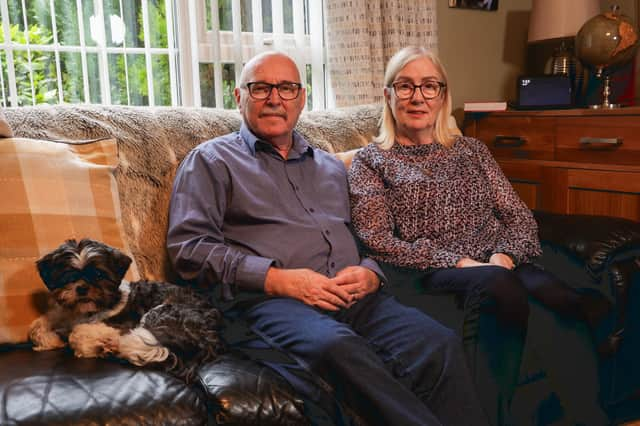Spot cancer early campaign backed by Co Tyrone grandad Lindsay McKinney living with lung cancer


The charity and its campaign partners are taking action because, although lung cancer is the second most common cancer in Northern Ireland, many people aren’t aware of the symptoms. It said this may be one of the reasons the disease is frequently diagnosed at a late stage when it’s much harder to treat.
The experience of Lindsay McKinney, aged 67, is at the heart of Cancer Research UK’s Spot Cancer Early campaign.
Advertisement
Hide AdAdvertisement
Hide AdHe says he will be eternally grateful to his wife Una, aged 64, who urged him to contact his GP because of a persistent cough and breathlessness which didn’t go away. The retired HGV driver, who has five sons, had at first thought his symptoms were due to a bout of Covid.
Lindsay, who was diagnosed with lung cancer in October 2022, said: “I’m so grateful to everyone who was involved in my treatment. My family, friends, neighbours and Una’s colleagues at work all rallied round and their support was amazing. But the person I want to thank most is Una, my wife of 35 years, who has been my rock. She was by my side throughout, attending every appointment every day for six weeks."
At first, Lindsay was told that he would only receive chemotherapy treatment as surgery and radiotherapy were not an option. After chemotherapy treatment began, scans showed the tumour had shrunk and Lindsay was told he would be a good candidate to take part in a clinical trial called Concorde, which is funded by Cancer Research UK. This allowed Lindsay to have a combination of chemotherapy drugs as well as radiotherapy.
“Now we are making the most of the time we have together to enjoy our wonderful family, including our grandchildren who bring a whole new meaning to our lives,” he said.
Advertisement
Hide AdAdvertisement
Hide AdLindsay is passionate about highlighting the importance of early diagnosis through ‘Spot Cancer Early’ – a campaign in Northern Ireland aimed at the over 50s. A video featuring his story will appear on Facebook advertising across Northern Ireland.
Running this March and April, the campaign also uses a powerful TV advert that features someone debating with themselves about whether to contact their doctor because they have a persistent cough and breathlessness. The ad finishes with the vital message: “Changes that are unusual for you, like unexplained weight loss, a persistent cough or breathlessness, could be signs of lung cancer. Finding cancer early could save your life. Talk to your GP, not yourself.”
Cancer Research UK Roadshow nurses will also be visiting Belfast and Londonderry to support the campaign The experienced nurses chat to people about how small changes to daily routines can reduce their cancer risk, encourage them to know what’s normal for their body and give them confidence to go to the GP with any concerns.
The charity is urging people not to delay contacting their doctor. While it can feel difficult to get an appointment, it’s important to keep trying. GP surgeries do want to hear from patients and it’s essential unusual symptoms are checked out.
Advertisement
Hide AdAdvertisement
Hide AdCancer Research UK’s chief executive Michelle Mitchell said: “Lung cancer is affecting too many families in Northern Ireland. We’d like to see many more people diagnosed at an early stage, when more treatment options are available. Unusual changes in your health such as breathlessness or a cough that won’t go away, could be signs of lung cancer. If you’ve noticed any of these changes, your GP wants to hear from you. In most cases, it will be a sign of something less serious, but if it is cancer, spotting it early can make all the difference.”
In NI, each year, around 10,100 people are given the news that they have cancer, with most cases being diagnosed in people aged 50 and over. Around 1,400 people are diagnosed with lung cancer each year.
The Spot Cancer Early campaign is funded by the Department of Health Cancer Charities Support Fund and supports the cancer strategy in Northern Ireland. It is being run by Cancer Research UK in partnership with the Public Health Agency and the NI Cancer Programme (Legacy NICaN). Adverts will be shown across TV and radio, on street posters, on social media and in newspapers.
Northern Ireland’s Health Minister Robin Swann MLA said: “We know the early diagnosis of cancer can be lifesaving which is why the Spot Cancer Early campaign is so important. It’s vital people in Northern Ireland are alert to symptoms like a persistent cough or breathlessness that won’t go away, and they contact their GP practice for further investigation.”
Advertisement
Hide AdAdvertisement
Hide AdThe campaign is also supported by the Royal College of General Practitioners. Its chair Ursula Mason said: “If you have noticed any unusual changes in your health, we are here to help you. Please do get in touch with your GP surgery who will do their very best to help find out what is causing your symptoms. In most cases it won’t be lung cancer, but if it is, spotting it early can make all the difference. Every person deserves the best chance of having an early-stage diagnosis when treatment is more likely to be successful.”
For more information visit cruk.org/northernireland
Comment Guidelines
National World encourages reader discussion on our stories. User feedback, insights and back-and-forth exchanges add a rich layer of context to reporting. Please review our Community Guidelines before commenting.